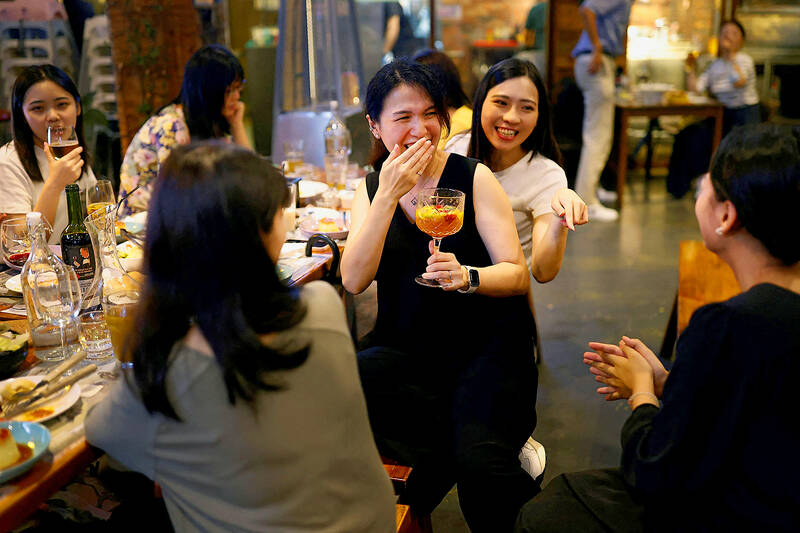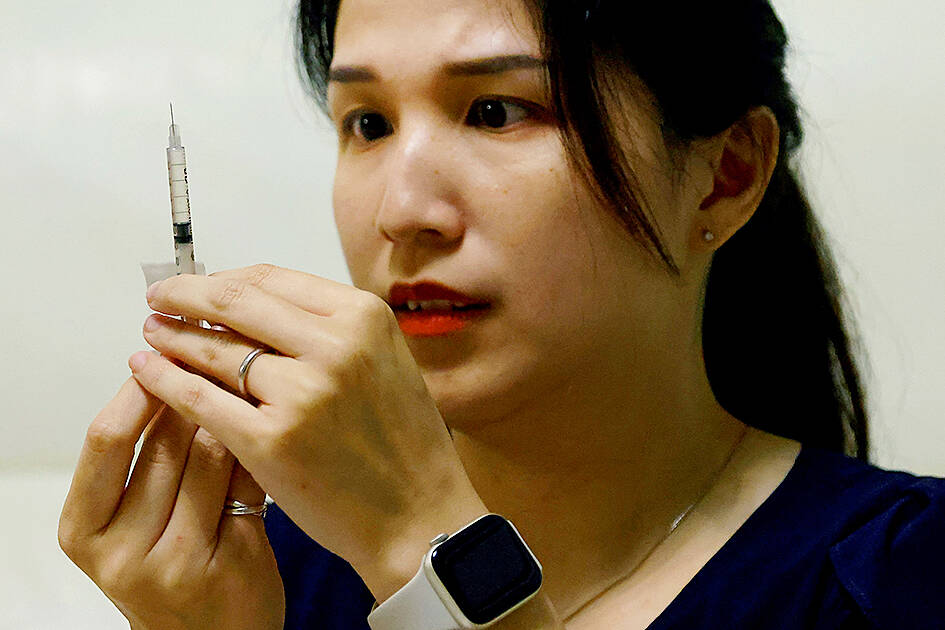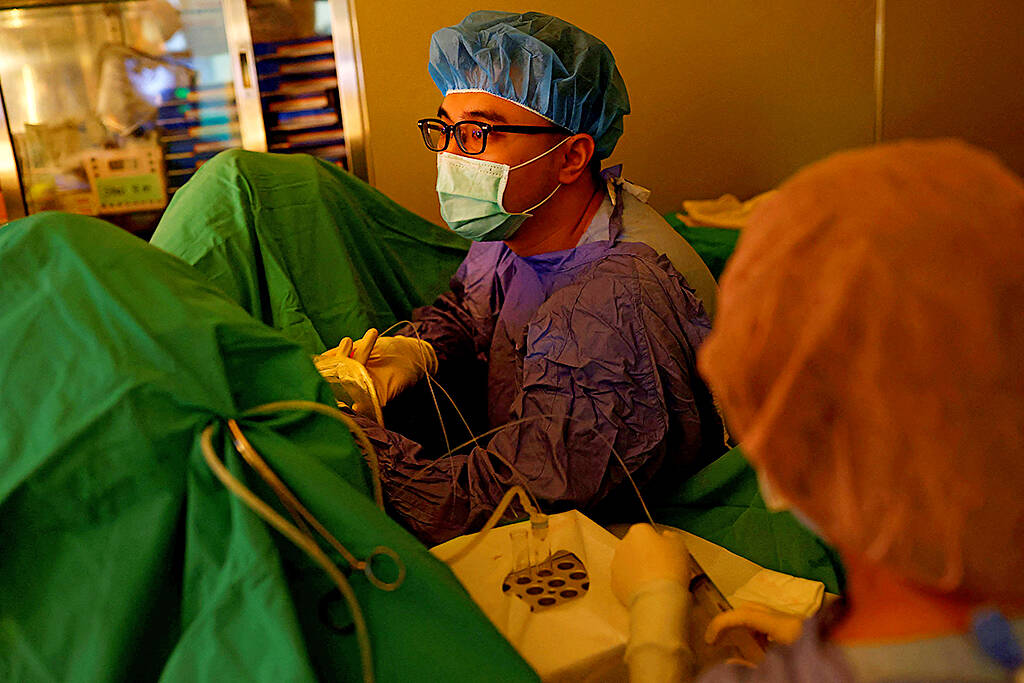Seated with her legs stretched out on her living room floor, Vivian Tung scrunched her bare stomach to find a spot where she could inject Rekovelle, a hormonal medicine used to stimulate egg production.
The 33-year-old Taiwanese brand marketing director had to inject herself daily over the two-week process it took to freeze her eggs.
Tung, who is single, is one of a rising number of women in Taiwan opting to freeze their eggs to give them the option to have a child later in life, even though under current laws they cannot use the eggs unless they marry.

Photo: Reuters
“It’s my insurance policy,” she said, explaining that many women in Taiwan are independent, career-focused and not looking to solely find a husband just to have children.
“My family is very supportive and respect my choice. When they hear that I buy insurance for myself, they also feel very good.”
Taiwan has a fertility rate of 0.89 children per woman, less than half the replacement level of 2.1 and one of the world’s lowest just behind South Korea and Hong Kong.

Photo: Reuters
Single women in Taiwan can freeze their eggs, but it is only legal to use the eggs in a heterosexual marriage, which excludes unmarried women and same-sex married couples.
Doctors in Taiwan said the restriction has contributed to only around 8 percent of women using their eggs after they have been frozen, compared with around 38 percent in the US.
LAW CHANGES

Photo: Reuters
Tung is hopeful that authorities could change regulations to allow unmarried women to have children in future.
Before her surgery, Tung had to visit the hospital every two to three days for blood tests to check her hormone levels to see how the eggs were developing, often at irregular times like 9pm due to her work schedule.
The effort was definitely worth it, she said.
“In a few years Taiwan’s laws could be liberalized due to trends or people’s rising awareness on the issue could help the government to make changes,” she said.
Taiwan became the first place in Asia to legalize same-sex marriage in 2019 and in May granted same-sex couples the right to jointly adopt a child.
But only about 4 percent of children in Taiwan are born out of wedlock, compared with about 40 percent in the US where it is more accepted.
Li Yi-Ping, chief director of the reproduction medical center at Taipei’s Shin Kong Wu Ho-Su Memorial Hospital, said there was a great chance of a policy change on egg access based on communications between the Taiwan Reproductive Association and the government, but the question was how long it would take.
“This is a very important national security issue. Now we must wait for society to form a consensus,” Li said.
Taiwan plans a comprehensive evaluation before deciding whether to expand access to artificial reproduction given it is a complex ethical, medical and legal issue involving many stakeholders, said Chen Li-Chuan, a policy specialist at the Ministry of Health and Welfare.
RISING TREND
Demand for egg freezing in Taiwan has surged, with the number of women aged between 35 and 39 opting for the technology up 86 percent over the past three years, according to a study by National Taiwan University Hospital.
More than a dozen centers offering egg freezing services opened in the last year following the pandemic, said Lai Hsing-Hua, founder of Taiwan’s first egg bank, the Stork Fertility Clinic.
Lai said new patients at Stork’s clinics in Taipei and Hsinchu have risen 50 percent year-on-year with the clinic freezing eggs for more than 800 women.
The frenzy comes as two local governments, Hsinchu and Taoyuan, this year started subsidizing egg freezing. However, only a combined 1,400 spots are available annually and an average annual salary of less than US$19,000 means egg freezing is out of reach for many women.
It costs US$2,600 to US$3,900 for the extraction, medicine and clinic visits, coupled with US$160 to US$320 in annual storage fees.
Tung paid herself, but her supportive parents drove her to the hospital on the morning of the surgery, where she pulled out her laptop in the back seat to finish some last-minute work.
Dressed in a green cotton robe and purple mesh hat to keep her hair off her face, Tung was put under general anesthesia for the 40-minute procedure and remained in the recovery room for two hours afterward.
“I’m in a lot of pain,” she said, with a blanket draped around her as she was escorted home by her parents. Once there, she appeared relaxed as she played with her dog on the living room floor.
“I really have a lot of peace of mind. If there is a chance in future and I want to have a child, at least I will have the opportunity.”

Most heroes are remembered for the battles they fought. Taiwan’s Black Bat Squadron is remembered for flying into Chinese airspace 838 times between 1953 and 1967, and for the 148 men whose sacrifice bought the intelligence that kept Taiwan secure. Two-thirds of the squadron died carrying out missions most people wouldn’t learn about for another 40 years. The squadron lost 15 aircraft and 148 crew members over those 14 years, making it the deadliest unit in Taiwan’s military history by casualty rate. They flew at night, often at low altitudes, straight into some of the most heavily defended airspace in Asia.

Beijing’s ironic, abusive tantrums aimed at Japan since Japanese Prime Minister Sanae Takaichi publicly stated that a Taiwan contingency would be an existential crisis for Japan, have revealed for all the world to see that the People’s Republic of China (PRC) lusts after Okinawa. We all owe Takaichi a debt of thanks for getting the PRC to make that public. The PRC and its netizens, taking their cue from the Chinese Communist Party (CCP), are presenting Okinawa by mirroring the claims about Taiwan. Official PRC propaganda organs began to wax lyrical about Okinawa’s “unsettled status” beginning last month. A Global

Taiwan’s democracy is at risk. Be very alarmed. This is not a drill. The current constitutional crisis progressed slowly, then suddenly. Political tensions, partisan hostility and emotions are all running high right when cool heads and calm negotiation are most needed. Oxford defines brinkmanship as: “The art or practice of pursuing a dangerous policy to the limits of safety before stopping, especially in politics.” It says the term comes from a quote from a 1956 Cold War interview with then-American Secretary of State John Foster Dulles, when he said: ‘The ability to get to the verge without getting into the war is

Like much in the world today, theater has experienced major disruptions over the six years since COVID-19. The pandemic, the war in Ukraine and social media have created a new normal of geopolitical and information uncertainty, and the performing arts are not immune to these effects. “Ten years ago people wanted to come to the theater to engage with important issues, but now the Internet allows them to engage with those issues powerfully and immediately,” said Faith Tan, programming director of the Esplanade in Singapore, speaking last week in Japan. “One reaction to unpredictability has been a renewed emphasis on